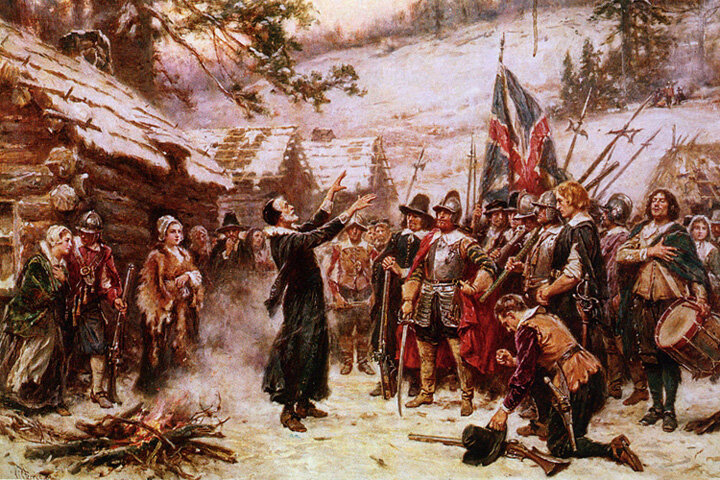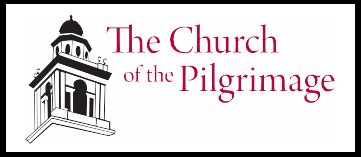
Detailed History
The Church of the Pilgrimage
Detailed History
The Church of the Pilgrimage in Town Square, Plymouth, Massachusetts, continues to carry on the faith and understanding of church government of the Pilgrim fathers and mothers. It has remained a Congregational church since the original “owning of the Covenant” at Scrooby, England in 1606. The leaders of the Scrooby, Babworth, Leyden churches were formative forces in what the church would become in early New England. Such outstanding leaders as John Robinson, William Bradford, William Brewster, and Richard Clyfton were associated with the early Pilgrim Church in England, Holland, and, in some cases, in New England.
In Leyden, Holland, John Robinson was called to be pastor of the Separatist Church which was eventually to become the Pilgrim Church at New Plimoth. Once their lengthy and arduous arrangements were made to settle in America, the Leyden congregation was forced to make a decision which would have far-reaching ramifications upon the development of Plimoth Plantation. The congregation voted that the pastor would accompany the Pilgrims to New England, only if the majority was able to leave Holland on the first emigration. The Elder, William Brewster, would lead and be spiritual advisor to the minority. As it turned out, the majority was compelled by circumstances to remain in the Netherlands, meaning that Pastor Robinson would not be a part of the Mayflower voyage. William Brewster, the Elder, would be fated to sail in the Mayflower and remain the colony’s religious leader for many years.
To the great loss of Plimoth Plantation, Pastor Robinson was never able to join his exiled congregation in America. He remained the church’s pastor, however, until his untimely death in 1625. There was not a “settled” pastor of the Plimoth congregation until Ralph Smith was called in 1629. One can only speculate as to what a difference the irenic presence of Robinson would have made in the development of both church and “body civil politic” in the Old Colony. Robinson was clearly the inspirational leader of the Pilgrims, and his absence was a great loss to both the church and fledgling government.
The Pilgrims were known as “Separatists” in England. That term was applied to them because they separated from the Church of England and, by so doing, were also separated from their beloved England. Their “Puritan” neighbors who emigrated to Salem and Boston had never officially separated from the Church of England and were thus looked upon more favorably by British authorities than were the Separatist Pilgrims.
A brief history of this sort cannot afford the historical detail which would be of value to the interested seeker. Suffice it here to say that the Pilgrims were among those who had great, if indirect, influence upon the formation of American democracy. The Pilgrim Church was composed of free people who ordered their own affairs. Each member had an equal vote in important matters affecting the church. This meant, of course, that the governance of the church was determined by democratic principles. It should be emphasized that the Pilgrims did not come to New Plimoth in order to establish a democratic society. Their primary motivation was to find a place where they were free to worship God according to their vision of church governance. They desired to be independent of any ecclesiastical hierarchy and the imposition of forms of worship contained, for instance, in The Prayer Book of the Church of England. The Pilgrims’ contribution to political democracy arose solely from the manner by which they governed their church. It was a natural evolution, however, for democratic principles to be applied to the “body civil politic” as need for civil government arose. In fact, the Pilgrims did apply such democratic principles to the ordering of their colony while still in Cape Cod Bay aboard the Mayflower. They drew up and signed the famed Mayflower Compact as a basic document which would govern both themselves and those “strangers” who arrived with them and who were not members of their congregation. Thus, democracy was to evolve from church to state.
The term applied to self-governing churches is “Congregationalism.” They are so called because the local congregation is free to govern itself without interference from any other ecclesiastical body or authority. Membership in a Congregational church is based upon “owning the Covenant” which, in the Pilgrim instance, was first formulated in tiny Scrooby, England in 1606, as has been mentioned. This covenantal relationship among members continues to be the basis of membership in The Church of the Pilgrimage until this day.
In the year 1801 a split occurred in the ancient congregation of the Pilgrims. The Rev. James Kendall was installed as minister of the congregation on January 1, 1800. The Rev. Kendall was known as a “liberal preacher” whose theology tended toward what was to become known as “Unitarianism.” On October 1, 1801, fifty-two persons withdrew from the First Parish because they could not agree with Rev. Kendall’s liberal tendencies. The seceding group organized itself into what was first called The Third Church of Christ in Plymouth. First Parish Church associated itself with the Unitarian movement with Rev. Kendall continuing as its pastor. The Unitarian Church kept all the records and the property, including the “Communion furniture” over which there was a mild controversy. The withdrawing church remained Congregational on the basis of the clear Trinitarian beliefs of the Pilgrim fathers and mothers.
The schism of 1801 was the first to occur over doctrinal matters in New England. The Church of the Pilgrimage (as it is now named) does not claim a legal or ecclesiastical origin beyond the year 1801. Spiritually and theologically, however, The Church of the Pilgrimage does claim to perpetuate the Trinitarian faith of the Pilgrims. The members of The Church of the Pilgrimage believe that its separation from Unitarian tendencies in 1801 was an act of restoring confidence in the insights of those who first “made covenant” in the hamlet of Scrooby in 1606, adhered to that covenant in Amsterdam and Leyden, and secured its perpetuation in New Plimoth from 1620 until this very day.
On November 24, 1840, a new church edifice was dedicated in Town Square very near the site of the Pilgrims’ first Meeting House. From that date the church has been known as The Church of the Pilgrimage, although that name did not become official until May of 1870 when it was adopted by a vote of the congregation. The name given to our church is an extraordinarily appropriate one. The name at once recognizes our spiritual legacy rooted in Scrooby, Leyden, and the Mayflower, while at the same time suggests that the cause, goals, and aspirations of our forebears remain in progress. We are not “The Church of the Pilgrims.” We are contemporary Christians who have owned and continue the pilgrimage toward truth and freedom which the Pilgrims have bequeathed to us as a spiritual legacy.
The Church of the Pilgrimage is now a member of The United Church of Christ. The members of the congregation voted in 1948 to become a part of the formation of our present denominational affiliation. The United Church of Christ, as a denomination, became official in 1957 when the Evangelical and Reformed Churches merged with the Congregational Christian Churches. Although we are a relatively young denomination, our own backgrounds make us the parent of American Protestantism.
The first pastor of the church, which became known as The Church of the Pilgrims, was The Rev. John Robinson. Although the Covenant dates to 1606 in Scrooby, Robinson did not become the church’s pastor until it had settled in Leyden in 1609. From 1609 until the present day, the church has had only thirty-one pastors. Congregational order and worship in Plymouth and America is now more than 400 years old, counting from the 1606 Scrooby Covenant. We have a long, venerable and faithful legacy of which we may be both proud and by which we are challenged. We confidently accept the peculiar challenges of the twenty-first century on the basis of an ancient covenant which is the bedrock of our congregation. That covenant also allows us to heed the God who established it, a God who speaks still in an ever changing world.
In 2006 the Covenant which formed the basis of our congregation was 400 years old. It was “owned” in Scrooby, England, carried into Holland and became the formative first principle of the church in Plymouth. For the 400th anniversary of the 1606 Scrooby Covenant Rev. Marks offered a revision of his own which is an updated version of the original Covenant. That revision of the document which established our congregation is printed below.
We have freely joined ourselves by a covenant of God into a church, into a community of the gospel, to walk in God’s ways made known, or to be made known to us, according to our best efforts. We commit ourselves to generosity in service and mission, God assisting us.
Rev. Gary L. Marks
30th Pastor,
The Church of the Pilgrimage
